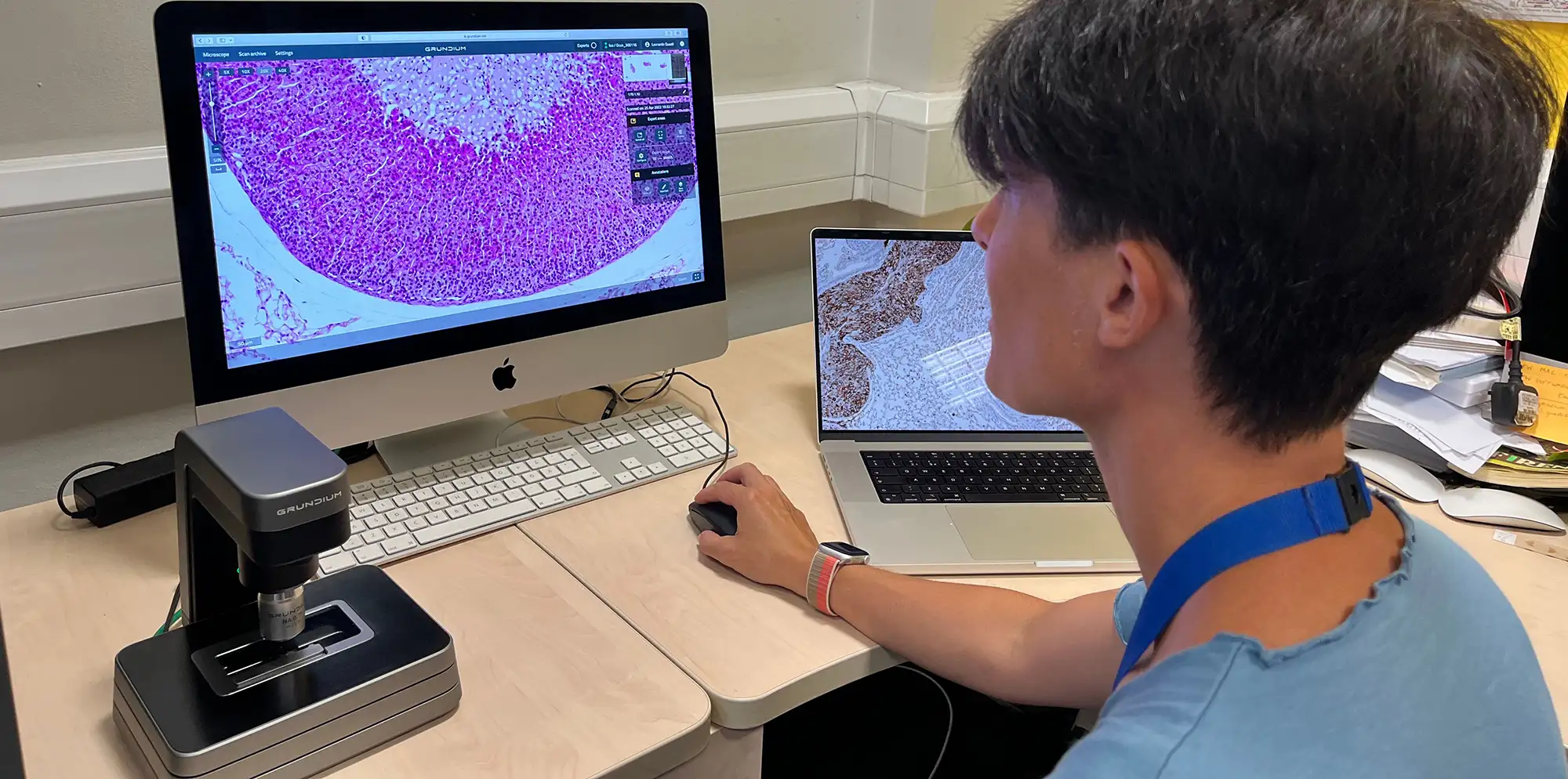
Dr. Leonardo Guasti, Reader in Endocrinology at the QMUL walks us through what happened when they purchased a Grundium Ocus®40 digital microscope scanner in September 2021.
The Centre for Endocrinology at the Queen Mary University of London in the UK knew they needed to find ways to work faster and smarter. Digitizing large specimens with a panoramic microscope camera meant constructing composite images, which took a lot of time and effort. The other option of sending their slides to be scanned by the University was both unfeasibly expensive for their research lab and took overnight to produce images.
The QMUL Centre for Endocrinology typically examines mouse embryos at different stages, looking for certain proteins and biomarkers on samples processed with H&E or immunohistochemistry prior to acquisition. The specimens are usually large sections, including adrenal, kidney, brain, whole embryos, and skin. The Centre for Endocrinology also examines human cancer tissue, and in both cases, the samples can be really large.
After their unit received a grant, Dr. Guasti knew he could improve their efficiency greatly by making the imaging process faster and more convenient with their own scanner. “We’re a research lab. We don’t need high throughput scanning equipment or continuous and automated loading of slides since we only create a maximum of around 20 slides per day. It is important we don’t spend too long on the scanning process”, Dr. Guasti says.
Dr. Guasti and his colleagues Dr. Katia Mariniello, BBSRC postdoc, and Dr. James Pittaway, MRC Clinical Research Fellow, looked around at different digital microscope scanners, comparing products online. “In the beginning we had all the usual brands and products on our list, but only the Grundium Ocus seemed to match our image quality requirements and our budget”, Dr. Guasti explains.
Most of the important information was already available on the Grundium website, but Dr. Guasti booked an online demo with Grundium sales. “The demo was very informative and helped us decide on the right scanner model for our use.” The Grundium Ocus®40, designed for high-resolution imaging and versatility, was the right choice for the QMUL Centre for Endocrinology and the device was delivered a few weeks later.

“Unlike the multi-slide scanners located a walk away across the street, the Ocus makes our work comfortable in that it is available immediately in our office or in the lab, and we can use it whenever we want. Before, the digital scans would come back the next day, and if they weren’t good, the process would start over.”, says Dr. Guasti.
“On a microscope, we’d have to make image composites to be able to examine sensibly, but the Ocus’ image resolution is so good we can easily just view the whole slide on a screen. Consultation is also quick and easy, and we can share our scans of unusual findings with an expert online.”
“If you have an idea of a sample of a previous case for a presentation or publication, you probably already have it scanned in high resolution, and you can just select the important part, or you find the slide and scan it in a matter of seconds!”, says Dr. Guasti enthusiastically. He continues: “It's also great that we can use the Ocus on any computer. I can use it on a desktop in the office, but if I take the Ocus home I can run it from my laptop.”
When discussing any potential issues identified after receiving the Ocus scanner, Dr. Guasti explains: “Initially we had internal IT problems which kept us from using the Ocus as much as we wanted to in the beginning. We found the Ocus so easy to use we could have started using in our work the same day, but because of other ongoing projects we ended up taking a couple of months to fully get going. We now routinely scan slides right away, …well, as soon as they’re dry!”, Guasti laughs.
Dr. Guasti: “Our workflow has improved a lot with the Ocus. We’re much faster now that we’re no longer wasting time.” With a smile on his face, he concludes: “It’s actually quite relaxing to hear the whirring sound of the scanner and change slides and scan again.”

